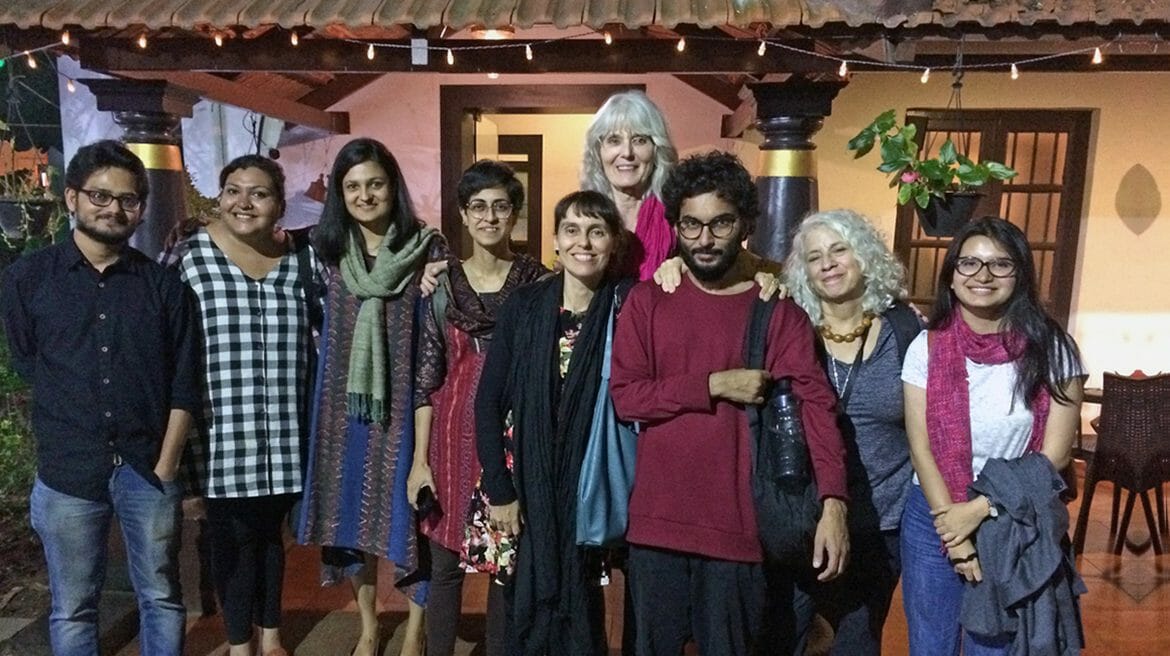Thanks to a professor’s international interactions, MTSU oral history students will be able to develop a fuller, richer approach to their work.

Dr. Martha Norkunas
Dr. Martha Norkunas’ attendance at the 2016 International Oral History Association conference in Bangalore, India, was so successful that it resulted in her election to the board. She participated in board meetings via email throughout 2017 and continues to participate in both board meetings and committee meetings.
A year after the conference ended, Norkunas was invited to teach at the Winter School of Oral History at the Shristi School of Art, Design and Technology in Bangalore. She presented a public lecture on landscape, power and memory, served on a public panel on memory and narrative and facilitated a series of oral history workshops for international students.
Getting to work with Indian historians was an enlightening experience for Norkunas, and she discovered some kindred spirits in her discipline.
 “There’s something about the Indian sensibility … that resonates so profoundly with me, which means, in turn, that my approach seems to resonate so profoundly with the Indian scholars and students,” Norkunas said.
“There’s something about the Indian sensibility … that resonates so profoundly with me, which means, in turn, that my approach seems to resonate so profoundly with the Indian scholars and students,” Norkunas said.
Norkunas directs the graduate oral history concentration at MTSU, one of five fields of specialization in the university’s nationally recognized Master of Arts in Public History Program.
MTSU was selected last fall to serve as the new home of the national Oral History Association for the next five years, bringing together scholars, activists, journalists, psychologists, folklorists and others interested in collecting and sharing the historical experiences of people from all walks of life. Along with the Public History Program, the Oral History Association is collaborating with many on-campus partners, including the Albert Gore Research Center, the Department of History, the Center for Historic Preservation, the Center for Popular Music and the College of Liberal Arts.
Part of Norkunas’s innovative method in teaching oral history is to have students engage in listening exercises and keep journals as they interview each other.
The professor said the craft of oral history enriches the historical record by incorporating personal narratives. It also focuses on the history of ordinary people, especially people whose voices often are left out of history.
“My students, at MTSU and around the world, debrief about the exercise and then they learn to do interviews about a whole range of ideas and topics like ‘How do you interview someone about joyous experiences or sorrow?,’ ‘How do you interview about landscapes or places of importance in their lives?,’ ‘How do you interview about traumatic memories?’,” Norkunas said about her students’ classwork.
What Norkunas discovered at the IOHA conference and at the Winter School in Oral History is that Indian historians have a more fluid process that breaks down Western restrictions.

MTSU professor Martha Norkunas, shown standing back row center, is joined by faculty and staff at the 2017 Winter School of Oral History in Bangalore, India, where Norkunas exchanged ideas with colleagues. (Photo submitted)
“They’ll look at the narratives in terms of metaphors and how we use images and representations to help express the narrative,” Norkunas said, citing the way Indian historians take note of their subjects’ daily lives in a way that relates their interior worlds to the larger world.
“It seems banal at first glance, but it’s a really important way to understand social history or the history of how people in an era live their lives,” she said. “It’s a more intimate and poetic way of looking at the past.”
Norkunas said she feels it’s important to integrate the processes and stories of people from various cultures into oral history, the practice of telling private stories that illuminate the public record.
“Public history doesn’t mean working with people who are like you,” Norkunas said. “It especially means you have to learn to work with people who are very different from you.”
For more information about oral and public history classes at MTSU, contact the Department of History at 615-898-2631 or Norkunas at 615-494-7701 or martha.norkunas@mtsu.edu. You also can watch the video below of Norkunas’s lecture, “Listening Across Differences,” from the Smithsonian Education lecture series presented by the Smithsonian Center for Learning and Digital Access at the Smithsonian Institution in Washington, D.C.
— Gina K. Logue (gina.logue@mtsu.edu)


COMMENTS ARE OFF THIS POST